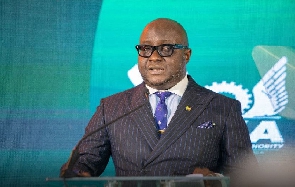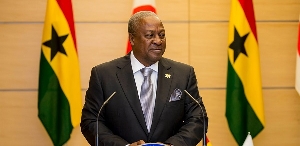The Ghana Free Zones Authority (GFZA) has signed a memorandum of understanding with a private developer for the development of about 1,500 acres of land designated in Yabiw/Shama in the Western Region.
The proposed investment is estimated at US$250million to US$300million regarding development of the designated Special Economic Zones.
Michael Oquaye Jnr., Chief Executive Officer of GFZA, was speaking at a media briefing to launch the 2023 week-long investment celebrations in Accra. This year’s celebration is on the theme ‘GFZA Championing Export-Led Industrial Growth in the Context of AFCFTA and World Trade’.
He said the investment is expected to provide world-class infrastructure: such as roads, electricity with a dedicated power plant, a sewage treatment plant, container depot, office complex and residential complex, among others. He said, in addition, the project when completed will lead to the creation of thousands of jobs and increased foreign exchange earnings for Ghana.
The CEO said out of the 217 active companies in the Free Zones enclave, 72 are wholly Ghanaian-owned companies, representing 33 percent; 74 are wholly foreign-owned companies, representing 34 percent; and 72 are joint ventures, representing 33 percent. “This is an indication that Ghanaian companies also have the potential to take advantage of free zone incentives and make a mark in the international market,” he said.
He said the Free Zones programme had been misconstrued as favouring mainly foreign investors.
Mr. Oquaye Jnr. Said, on the contrary, the programme is open to all investors, both foreign and local. “Moreover, with the opportunities that AfCFTA also offers, we are encouraging Ghanaian-owned businesses to take advantage of the 1.3 billion African market to expand their activities,” he added.
The CEO said the impact of these achievements on the economy cannot be overemphasised. He said the theme was chosen to reflect government’s focus on export-led industrialisation and the AfCFTA’s implementation.
Mr. Oquaye Jnr. said: “As a country, we are currently grappling with a balance of trade deficit and depreciation of our national currency; therefore, we must increase our exports to earn the needed foreign exchange to stabilise the cedi”.
He said export-led industrial growth is one of the most appropriate strategies to achieve economic development, and this has been the GFZA’s mandate.
Thus, the Free Zones programme’s importance in reversing the country’s balance of trade deficit and the cedi’s depreciation is vital.
He said the Authority recognises the AfCFTA’s potential for attracting market-seeking investments and encouraging local businesses to export into the African market. The AFCFTA presents Ghana with the opportunity of exporting to the rest Africa, with an estimated market size of 1.3 billion people.
He said in pursuing an export-led industrial growth strategy and the enormous opportunities AfCFTA and the world at large provide, the problems of unemployment, low export earnings, lack of value addition to our natural resources, lack of diversification in our export products, and being an insignificant player in continental and global value chains can be solved.
He said regarding their achievements, 39 new companies have been licenced and are expected to inject an estimated capital of US$230million into the economy. In addition, the estimated export earnings from the 39 companies are US$529million from an estimated production value of US$436million.
He reported that the cumulative exports from the Free Zones enterprise since the programme’s inception stood at US$27billion as of 2020.
Click to view details



Business News of Friday, 11 November 2022
Source: thebftonline.com

















